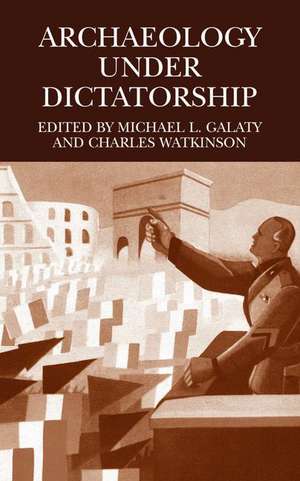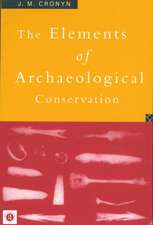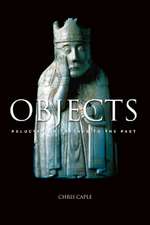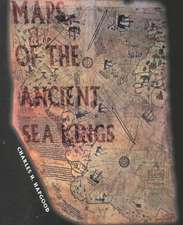Archaeology Under Dictatorship
Editat de Michael L. Galaty, Charles Watkinsonen Limba Engleză Hardback – 2 iul 2004
The connections between politics and archaeology become most visible, however, within a totalitarian dictatorship, when a dictator seeks to create and legitimize new state-supported ideologies. Any dictator may attempt to control and exploit the past, often by directly controlling archaeologists. The degree to which a nation's archaeological system may continue to be affected after the fall of the dictator depends upon both the previous regime's ideological position and its level of dependence upon archaeology, and the response of archaeologists to the regime, collectively and individually.
Archaeology Under Dictatorship demonstrates that the study of archaeology as it evolved under modern dictatorships is today, more than ever, of critical importance. For example, in many European countries those who practiced archaeology under dictatorship are retiring or dying. In some places, their intellectual legacy is being pursued uncritically by a younger generation of archaeologists. Now is the time, therefore, to understand how archaeologists have supported, and sometimes subverted, dictatorial political ideologies. In studying archaeology as practiced under totalitarian dictatorship, that most harsh of political systems, light is shed on the issue of politics and archaeology generally.
This volume aims to provide a theoretical basis for understanding the specific effects of totalitarian dictatorship upon the practice of archaeology, both during and after the dictator's reign. The nine essays explore experiences from every corner of the Mediterranean; from the heartlands of Italy, Spain and Greece, to the less well-known shores of Albania and Libya. With its wide-rangeof case-studies and strong theoretical orientation, this volume is a major advance in the study of the history and politics of archaeology. The Mediterranean focus will also make it thought-provoking reading for classical archaeologists and historians.
| Toate formatele și edițiile | Preț | Express |
|---|---|---|
| Paperback (1) | 639.41 lei 6-8 săpt. | |
| Springer Us – 2 mai 2006 | 639.41 lei 6-8 săpt. | |
| Hardback (1) | 643.99 lei 6-8 săpt. | |
| Springer Us – 2 iul 2004 | 643.99 lei 6-8 săpt. |
Preț: 643.99 lei
Preț vechi: 757.63 lei
-15% Nou
Puncte Express: 966
Preț estimativ în valută:
123.24€ • 127.32$ • 102.57£
123.24€ • 127.32$ • 102.57£
Carte tipărită la comandă
Livrare economică 26 martie-09 aprilie
Preluare comenzi: 021 569.72.76
Specificații
ISBN-13: 9780306485084
ISBN-10: 0306485087
Pagini: 218
Ilustrații: X, 218 p.
Dimensiuni: 155 x 235 x 18 mm
Greutate: 0.52 kg
Ediția:2004
Editura: Springer Us
Colecția Springer
Locul publicării:New York, NY, United States
ISBN-10: 0306485087
Pagini: 218
Ilustrații: X, 218 p.
Dimensiuni: 155 x 235 x 18 mm
Greutate: 0.52 kg
Ediția:2004
Editura: Springer Us
Colecția Springer
Locul publicării:New York, NY, United States
Public țintă
ResearchCuprins
The Practice of Archaeology Under Dictatorship.- Fascism in the Desert A Microcosmic View of Archaeological Politics.- The Trojans in Epirus: Archaeology, Myth and Identity in Inter-War Albania.- Italian Colonial Archaeology in Libya 1912–1942.- Italian Archaeology in Libya From Colonial Romanità to Decolonization of the Past.- Archaeological Resource Management Under Franco's Spain The Comisaría General de Excavaciones Arqueológicas.- Whose Hittites, and Why? Language, Archaeology and the Quest for the Original Turks.- On the Stage and Behind the Scenes Greek Archaeology in Times of Dictatorship.- Dealing with the Devil The Faustian Bargain of Archaeology Under Dictatorship.
Notă biografică
The Practice of Archaeology Under Dictatorship – Fascism in the Desert: A Microcosmic View of Archaeological Politics – The Trojans in Epirus: Archaeology, Myth and Identity in Inter-Way Albania – Italian Colonial Archaeology in Libya 1912-1942 – Italian Archaeology in Libya: From Colonial Romanita to Decolonization of the Past – Archaeological Resource Management Under Franco’s Spain: The Comisaria General de Excavaciones Arqueologicas – Whose Hittites, and Why? Language, Archaeology and the Quest for the Original Turks, On the Stage and Behind the Scenes: Greek Archaeology in Times of Dictatorship – Dealing with the Devil: The Faustian Bargain of Archaeology Under Dictatorship
Caracteristici
Not only deals with nationalism, but also the lingering effects that a dictatorship can have on the historical and archaeological record Includes supplementary material: sn.pub/extras












